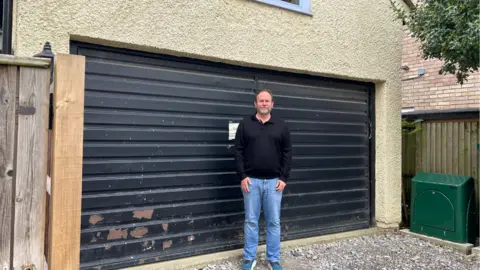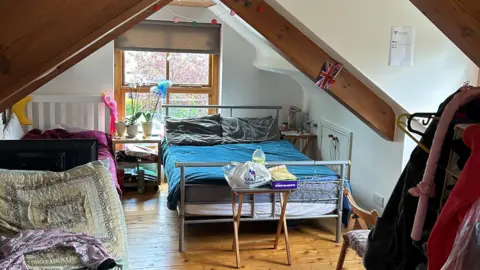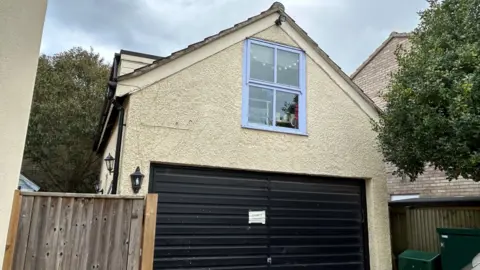'Housing refugees made us financially worse off'
 BBC
BBCA family have been left confused and "financially worse off" after the garage in which they housed Ukrainian refugees was given a council tax band.
The garage and space above it in Melbourn, Cambridgeshire, was built before the family bought their home and was used for storage and an office.
It was made into a liveable space to house Ukrainian refugees and was reported to the Valuation Office Agency (VOA) as a "self-contained annexe" by South Cambridgeshire District Council.
The family must now pay council tax on their garage and the band of their own home was raised. The council said it had asked for an "urgent review" of the taxing decision.
'That address doesn't exist'
Andy Kulina said: "Like most families we don't have a lot of spare money. We saw an opportunity [to help refugees] that didn't require much time or money and there was space in my office."
A council communities team visited the space to ensure it was suitable for someone to live in under the Homes for Ukraine scheme, which enabled UK sponsors to register to host Ukrainian refugees for at least six months.
A family of three moved in and shared utilities, the garden, letterbox, washing line and the driveway with the host family.
"Their child is about the same age as my daughter, so they play together," said Mr Kulina.
"They're living in our house, so they don't pay council tax because it is all one property."
 Andy Kulina
Andy KulinaUnder the scheme, council tax should be paid by the hosts or refugees for "self-contained accommodation".
Mr Kulina said his garage and the space above it had never previously been classed as "self-contained". It was, he said, part of his home and there had never been any mention of a separate tax.
A letter addressed to "The Annex" was received and contained a council tax bill for more than £3,000, backdated to November 2022 when the Ukrainian family had arrived.
"That address doesn't exist," said Mr Kulina. "It is a garage with a loft conversion that was here when we bought the house in 2007."
Two letters from the VOA followed to notify "The Annex" that the property was in band A and the main house had been moved from band F to G.
The council said it had a duty to inform the agency when it became aware of a self-contained annexe not banded for council tax.
It said the decision to tax it was taken by the VOA.
 Andy Kulina
Andy KulinaMr Kulina said he had appealed against the decision.
He added he had been in contact with people in both local and national government, but had been unable to speak to a "senior government official to help rectify the situation".
South Cambridgeshire Council said it had written a letter to support Mr Kulina.
"We made something liveable on request of the government," Mr Kulina said. "The use of the property was temporary.
"Now they are moving on, it will revert to use as an office and we will have to pay two council tax bills.
"By doing this kind act and participating in Homes for Ukraine we got to a situation where we're financially worse off and neither local nor national government are helping to rectify the situation.
"No-one with authority is owning the task of fighting for us."
'Time of greatest need'
A council spokesperson said the authority had asked the government for an urgent review, adding: "When the government launched the Homes for Ukraine scheme, they stated that hosts would not be financially worse off because of providing a home to refugees at their time of greatest need.
"Our view is that council tax banding on an annexe like this should be paused when a Homes for Ukraine guest is being hosted. We have not yet had a response."
A VOA spokesperson appreciated it was a "challenging situation for the homeowner", but said it had a legal duty to assign a council tax band to "any property capable of being lived in, including self-contained units connected to a main property".
Follow Cambridgeshire news on Facebook, Instagram and X. Got a story? Email [email protected] or WhatsApp us on 0800 169 1830
